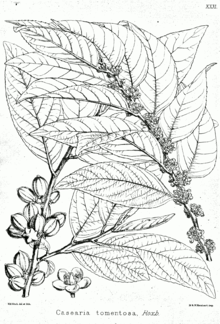Casearia
| Casearia | |
|---|---|
 |
|
| Casearia tomentosa parts drawing | |
| Scientific classification | |
| Kingdom: | Plantae |
| (unranked): | Angiosperms |
| (unranked): | Eudicots |
| (unranked): | Rosids |
| Order: | Malpighiales |
| Family: | Salicaceae |
| Tribe: | Samydeae |
| Genus: |
Casearia Jacq. |
| Species | |
|
Numerous, see text |
|
| Synonyms | |
|
|
Numerous, see text
Casearia is a plant genus in the family Salicaceae. The genus was included in the Flacourtiaceae under the Cronquist system of angiosperm classification, and earlier in the Samydaceae. Recent research indicates that the latter group might be reinstated as a valid family.
They are sometimes employed as honey plants, notably C. decandra and C. sylvestris. The latter species is occasionally used as food by the caterpillars of the two-barred flasher (Astraptes fulgerator). Several species are becoming rare due to deforestation. Some appear close to extinction, and C. quinduensis of Colombia and C. tinifolia from Mauritius seem to be extinct since some time in the 20th century and about 1976, respectively.
...
Wikipedia
